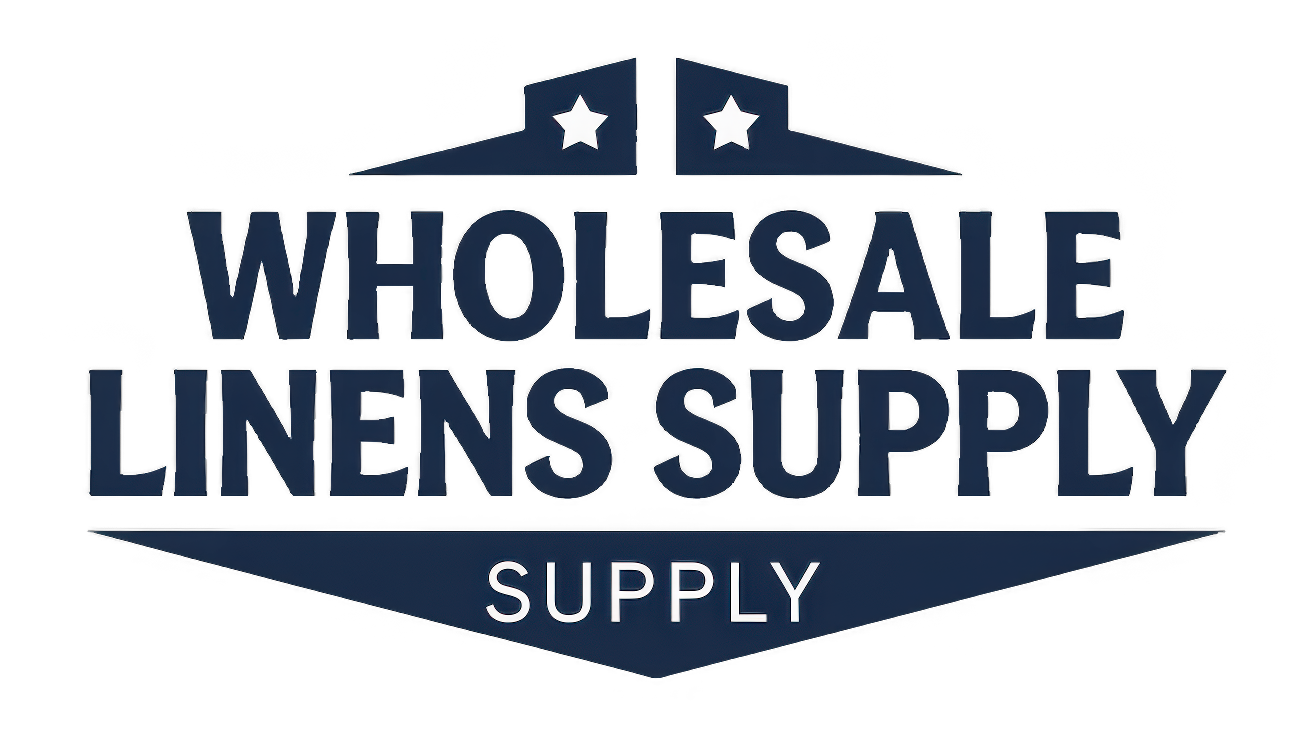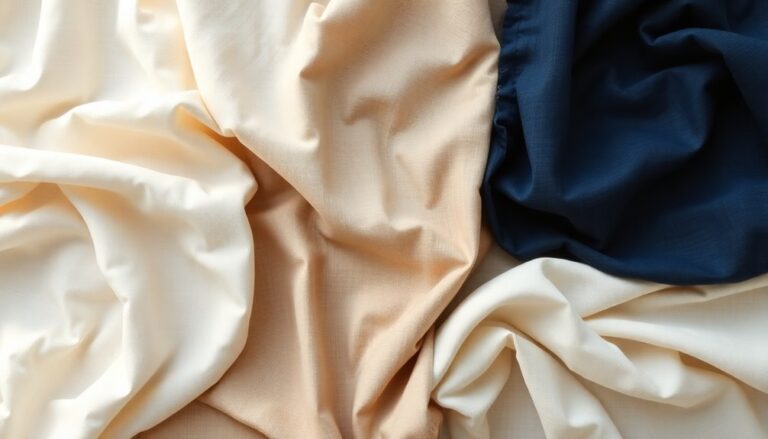Fair trade linens play a crucial role in nurturing sustainable practices and uplifting communities. They guarantee artisans and farmers receive fair wages as they promote eco-friendly production methods. By utilizing sustainable materials and encouraging responsible sourcing, these textiles reduce environmental impact and support biodiversity. Furthermore, fair trade linens highlight unique craftsmanship and quality in home decor. Those interested in making a conscious choice for their homes can find more valuable insights on this topic.
Article Highlights
- Fair trade linens ensure equitable trading conditions, providing artisans and farmers with fair wages and safe working environments.
- They are produced using sustainable materials and eco-friendly processes, reducing environmental impact and promoting biodiversity.
- Empowering local communities, fair trade linens fund initiatives like education and healthcare, helping to break the cycle of poverty.
- These linens offer superior quality and unique designs, showcasing traditional craftsmanship while aligning with sustainable fashion principles.
- Choosing fair trade linens supports ethical sourcing, benefiting producers and consumers and encouraging responsible consumption.
Understanding Fair Trade Principles

Fair trade principles focus on creating equitable trading conditions, ensuring that producers in developing countries receive fair wages and work in safe environments. These principles promote fair trade certification, which serves as a guarantee that products meet specific social, economic, and environmental standards. By supporting ethical sourcing, consumers can choose products that not merely benefit their own interests but additionally contribute positively to the lives of producers. This approach nurtures sustainable development, allowing communities to thrive. Fair trade practices empower workers, enabling them to invest in their education and health, ultimately breaking the cycle of poverty. By comprehending these principles, consumers can make informed choices that align with their values, promoting a more just and equitable global economy.
The Environmental Impact of Fair Trade Linens
Choosing fair trade linens not just supports equitable treatment of producers but furthermore addresses significant environmental concerns. These linens are often made from sustainable materials, which reduces reliance on harmful chemicals and pesticides that can damage ecosystems. The eco-friendly production processes emphasize minimal waste and energy efficiency, further decreasing their carbon footprint. By opting for fair trade linens, consumers contribute to a system that prioritizes environmental stewardship. Moreover, fair trade practices encourage responsible sourcing and promote biodiversity through better farming practices. This approach not only benefits the planet but likewise guarantees that the artisans and farmers involved can thrive. In the end, choosing fair trade linens helps create a more sustainable future for both individuals and the environment.
Empowering Artisans and Farmers

Though the production of fair trade linens focuses on sustainability, it also plays a crucial role in empowering artisans and farmers. By supporting fair trade practices, consumers contribute to significant changes in the lives of these individuals.
- Fair wages guarantee artisans receive a living income.
- Skill development provides training for improved craftsmanship.
- Community investment nurtures local projects like schools and health care.
- Market access connects farmers and artisans to global consumers.
These elements improve artisan empowerment and farmer support, enabling them to break the cycle of poverty. As artisans gain confidence and farmers secure stable incomes, they can create better futures for their families and communities, ultimately transforming their livelihoods through fair trade initiatives.
Quality and Style: The Benefits of Fair Trade Linens
When considering linens that combine elegance with ethical production, many find that fair trade options stand out for their superior quality and unique style. These luxury textiles are crafted with care, ensuring each piece is not only beautiful but also durable. Fair trade practices improve the overall aesthetic, as artisans often use traditional techniques and high-quality materials, resulting in distinctive designs that uplift any space. Furthermore, consumers are drawn to the principles of sustainable fashion, knowing their purchases support ethical labor and environmentally-friendly practices. This commitment to quality and style makes fair trade linens a conscious choice, appealing to those who appreciate both luxury and responsibility in their home decor.
How to Choose Fair Trade Linens for Your Home

To select the perfect fair trade linens for their home, buyers should first consider the materials used in the products. Comprehending sourcing materials is essential, as it impacts both quality and ethical standards. Here are four key factors to help in choosing suppliers:
- Material Quality: Look for natural fibers like organic cotton or linen.
- Certification: Verify the products have recognized fair trade certifications.
- Supplier Transparency: Choose brands that openly share their sourcing practices.
- Sustainability Practices: Opt for suppliers committed to environmentally friendly production methods.
Frequently Asked Questions
What Certifications Should I Look for in Fair Trade Linens?
When searching for fair trade linens, one should look for certifications like Fair Trade Certified and GOTS (Global Organic Textile Standard). These symbols act as beacons, illuminating the path toward sustainable sourcing and ethical manufacturing. They guarantee that the linens were created in a way that respects both the planet and its people. By choosing certified linens, consumers can wrap themselves in comfort as they support a fairer world for all. Fair trade linens also ensure that workers receive fair wages and operate in safe conditions, fostering a more just and sustainable textile industry. Additionally, these linens are often made with organic materials, reducing environmental impact and promoting eco-friendly farming practices. By investing in fair trade linens, consumers make a meaningful difference in the lives of artisans and farmers worldwide.
Are Fair Trade Linens More Expensive Than Conventional Options?
When considering whether fair trade linens are more expensive than conventional options, it's important to look at price comparison. Many consumers perceive fair trade products as pricier because of their ethical production methods and sustainable practices. Nevertheless, this perception can be misleading, as the longevity and quality of fair trade linens often justify the higher initial cost. In the end, consumers might find that investing in fair trade supports better living conditions for producers, making it worthwhile.
How Can I Verify a Company's Fair Trade Claims?
When searching for truth in a world of shiny marketing claims, one might wonder if companies are just playing dress-up in fair trade costumes. To verify a company's fair trade claims, one should look for evidence of third party audits; these are the watchdogs of authenticity. Furthermore, consumer awareness is key—researching the brand's practices and certifications can reveal the real story behind the linens, ensuring ethical choices are made with confidence.
What Types of Linens Are Available as Fair Trade Products?
When exploring fair trade linens, one can find a variety of options. These often include bed sheets, pillowcases, and duvet covers made from organic cotton. Many companies likewise offer table linens and towels crafted from sustainable materials, ensuring ethical production practices. Shoppers looking for fair trade products should consider these choices, as they not only support responsible sourcing but additionally promote environmental sustainability and fair labor practices in the textile industry.
Do Fair Trade Linens Come With a Warranty or Return Policy?
Like a safety net for your investments, warranties and return policies for fair trade linens can vary. Most reputable brands provide clear warranty details, ensuring customers feel secure in their purchase. Return options are typically outlined on their websites, allowing for hassle-free exchanges if needed. It's important for buyers to review these policies before committing, as they can differ considerably between manufacturers, offering peace of mind in choosing ethically made products.













